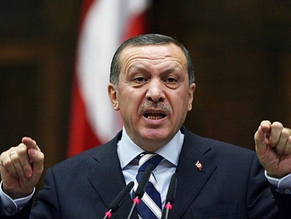|
World Jewish News

Recep Tayyip Erdogan (photo by nrhz.de)
|
Israel accuses Turkish PM of inciting anti-Semitism
26.01.2010, Israel and the World Deputy Foreign Minister Danny Ayalon's humiliation of the Turkish ambassador earlier this month seriously offended Turkey, but also made it clear to Ankara that it had crossed red lines in its relationship with Israel, according to a report on Israel-Turkey relations prepared by the Foreign Ministry.
The seven-page report, which was submitted to the "septet" of key cabinet ministers a few days ago, also charged that Turkish Prime Minister Recep Tayyip Erdogan "indirectly incites and encourages" anti-Semitism.
The report was written by the Center for Political Research, which performs the ministry's in-house intelligence analysis, and has already been distributed to Israeli embassies and consulates abroad. Foreign Minister Avigdor Lieberman and Ayalon, both of Yisrael Beiteinu, are the leaders of the government's aggressive anti-Turkey faction, while Defense Minister Ehud Barak and Industry Minister Benjamin Ben-Eliezer, both of Labor, head the conciliatory, pro-Turkey faction.
Regarding Ayalon's humiliation of the ambassador, the report said that while this seriously offended the Turks for many years to come, "at the same time, the manner in which senior Turkish officials, including Erdogan, ended the crisis may indicate that Turkey recognizes that it entered the red-line zone and [reached] the outer limits of the Israeli government's patience, and that this was liable to lead to it losing Israel, which would damage Turkey's international legitimacy."
But most of the report focuses on Erdogan, which it considers the main source of the current friction. "In our estimate, ever since his party took power, Erdogan has conducted an ongoing process of ... fashioning a negative view of Israel in Turkish public opinion," via endless talk of Palestinian suffering, repeatedly accusing Israel of war crimes and even "anti-Semitic expressions and incitement," it read.
Though in international forums Erdogan always stresses that anti-Semitism is "a crime against humanity," the report continued, in reality, he "indirectly incites and encourages" anti-Semitism in Turkey. "For Erdogan and some of those around him," it explained, "there is no distinction between 'Israeli' and 'Jewish,' and therefore, [their] anti-Israel fervor and criticism become anti-Jewish."
One result, the report said, is articles in the Turkish press questioning whether Turkish Jews are loyal to their country - something that could endanger Turkey's Jewish community.
In some cases, it added, Erdogan simply does not understand the anti-Semitic nature of his remarks - such as "Jews are good with money," which "he sees as a compliment."
Another way in which Erdogan encourages anti-Semitism is the backing he has given to radical Islamist newspapers, the report said. As an example, it cited the paper Vakit - which was originally also published in Germany, but was shut down there due to its anti-Semitic content. Vakit journalists, the report noted, are often invited to accompany Erdogan in his presidential plane on state visits overseas, and Turkish President Abdullah Gul called Vakit "the first paper he reads every morning."
Erdogan also "grants legitimacy" or "turns a blind eye" to anti-Israeli television programs "of an inflammatory, anti-Semitic nature," such as "Valley of the Wolves" - the series that prompted Ayalon's rebuke of the ambassador. The claim that this is just freedom of the press at work, the report said, is belied not only by the fact that such programs are approved by the Turkish censor, but by reports from Turkish journalists who say this freedom has been sharply curtailed in recent months: they say that "editorial policy is dictated by government bodies, journalists' phones and offices have been wiretapped, pressure has been applied to owners of mainstream media outlets, and there is tight supervision of Internet sites."
"For Erdogan, Israel-bashing is a way of bolstering his status with Islamic and Middle Eastern states, which Turkey would like to lead, and against the Turkish opposition, as well as with his own party's target audience and nationalist elements of the Turkish public," the report argued. Moreover, its cost is low.
The report rejected the Turkish claim that Erdogan is merely responding to Turkish public opinion, saying that in reality, Turkey's government is leading public opinion, not following it.
"Turkey today, under the leadership of the AKP [Erdogan's party], is different from the Turkey with which Israel forged a strategic relationship in the early 1990s," it concluded gloomily.
By Barak Ravid
Haaretz.com
|
|
